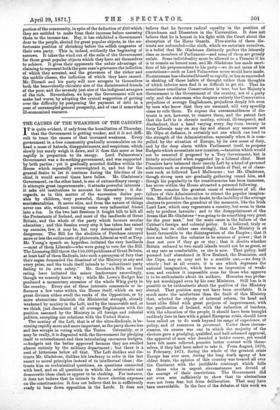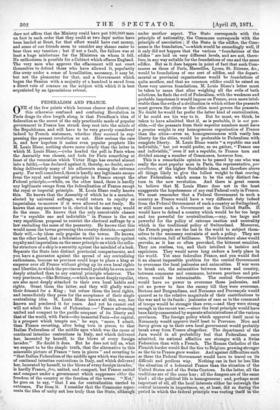THE CAUSES OF THE WEAKNESS OF THE CABINET.
iT is quite evident, if only from the humiliation of Thursday, that the Government is getting weaker, and it is not diffi- cult to trace the causes of that increased weakness. Every government in a free community gradually accumulates on its head a mass of hatreds, disappointments, and suspicions, which slowly but surely weigh it down, and it does this more or less
rapidly in proportion to its energy. Lord Palmerston's Government was a do-nothing government, and was supported by both parties ; yet it gradually accreted dislikes within the House which repeatedly overweighted it, and but for the general desire to let it continue during the life-time of its chief, it would several times have fallen. Mr. Gladstone's Government, on the other hand, is one of extraordinary energy ; it attempts great improvements ; it attacks powerful interests ; it asks old institutions to account for themselves ; it dis- regards, as in this matter of the succession duties pay- able by children, very powerful, though very irrational sentittentalities. It never stirs, and from the nature of things never can stir, without turning some very influential friend into a foe. In the two last Sessions it fought hilt to hilt all the Protestants of Ireland, and most of the landlords of Great Britain, and the whole of the party which favours secular education ; and this Session every step it has taken has raised up enemies, few, it may be, but very determined and very dangerous. The Bill for the abolition of Purchase annoyed more or less the entire caste of plutocrats, Liberal as well as Tory. Mr. Young's speech on hypothec irritated the very landlords —most of them Liberals—who were going to vote for the Bill. The Licensing Bill threw the 150,000 publicans of Great Britain, at least half of them Radicals, into such a paroxysm of fury that their organ demanded the dismissal of the Ministry at any and every price, and the trade itself intends to "subordinate party feeling to its own safety." Mr. Goschen's Bills on local rating have irritated the minor landowners exceedingly, though we scarcely know why ; while Mr. Lowe's Budget has produced a momentary secession of the whole Whig party in the country. Every one of these interests commands or in- fluences a few votes within the House itself, which on any great division either swell the ranks of the Opposition, or by mere abstentions diminish the Ministerial strength, already weakened by mutiny in the Left, and by the immovable and, as we think, just discontent of all average Englishmen with the position assumed by the Ministry in all foreign and colonial politics, excepting our relations with the United States.
The mutiny of the Left, that is of the ultra-Radicals, is be- coming rapidly more and more important, as the party shows less
and less scruple in voting with the Tories. Ostensibly, or it may be really, it is disgusted with the Government for pledging itself to retrenchment and then introducing enormous budgets, —budgets not the better approved because they are swelled almost entirely by the military department ; but there is a root of bitterness below all that. The Left dislikes and dis- trusts Mr. Gladstone, dislikes his tendency to refer in the last resort to moral principles instead of to intellectual ideas ; dis- trusts him on ecclesiastical questions, on questions connected with land, and on all questions in which the aristocratic and democratic ideas clash or appear to be clashing. For instance, it does not believe that he intends to throw election expenses on the constituencies. It does not believe that he is sufficiently ready to bear down opposition in the Lords. It does not believe that he favours radical equality in the position of Churchmen and Dissenters in the Universities. It does not believe that he is honest in his fight with the Court about the absorption of the Horse Guards. Five-sixths of these dis- trusts are unfounded—the sixth, which we entertain ourselves, is a belief that Mr. Gladstone distinctly prefers the leisurely class as members of Parliament—and some of them are grossly unfair. Some individuality must be allowed to a Premier if he is to remain an honest man, and Mr. Gladstone has made sacri- fices of his prepossessions to his party—we do not mean of his convictions—such as Lord Palmerston never would have made. No statesman has educated himself so rapidly, or has so succeeded in shaking off those habits of thought rather than thoughts of which inferior men find it so difficult to get rid. That he sometimes conciliates Conservatives is true, but her Majesty's Government is the Government of the country, not of a party only, and the statesman who despises entirely the Conservative prejudices of average Englishmen, prejudices deeply felt even by men who know that they are unsound, will very speedily cease to rule them. To expose the unreasonableness of dis- trusts is not, however, to remove them, and the patent fact that the Left is in chronic mutiny, critical, ill-tempered, and disobedient, that a band varying every day from twenty to forty Liberals may on any day and almost any measure set Mr. Glyn at defiance, is certainly not one which can tend to the strength of the Administration, especially when it is com- pelled, by the situation of Europe, by its own sense of duty, and by the deep alarm within Parliament itself, to propose Budgets which necessitate new taxation,—taxation which would not be resented if proposed by a Tory Government, but is bitterly scrutinized when suggested by a Liberal chief. Most Premiers have balanced their unruly Left by a band of persona/ adherents such as strengthened the hands of Peel, or of clans- men such as followed Lord Melbourne ; but Mr. Gladstone, though strong men are gradually gathering round him, and though his popularity in the constituencies has been immense, has never within the House attracted a personal following.
There remains the greatest cause of weakness of all, the failure of this Administration to attract the popular imagina- tion. Much of this is due, no doubt, to the inability of the average electors to perceive the grandeur of the measures, like the Irish Land Law, which may regenerate a country, but seem to them only to produce lawsuits ; and to the disappointment of the dream that Mr. Gladstone "was going to do something very great for the poor man," but the main cause is the failure of the Cabinet's foreign and colonial policy. It is believed, truly or falsely, but in either case strongly, that the Ministry is at heart favourable to the disintegration of the Empire ; that it does not believe the colonies to be sources of power ; that it does not care if they go or stay ; that it doubts whether Britain reduced to two small islands would not be as great, or at any rate as comfortable, as she is now. That policy, half pursued half abandoned in New Zealand, the Dominion, and the Cape, may or may not be a sensible one,—we deny it utterly ; but at all events, it. is one which depresses the national imagination, which leaves an impression of weak- ness, and renders it impossible even for those who approve it to be enthusiastic about its authors. Honorius was proba- bly not worshipped even by his own Ministers. Still less is it possible to be enthusiastic about the position of the Ministry abroad. That position may not have been avoidable. It is much more the misfortune than the fault of this Ministry that, selected for objects of internal reform, its head and heart alike filled with great projects of improvement, with the pacification of Ireland, with the reduction of burdens, with the education of the people, it should have been brought suddenly face to face with a grand European crisis, should have been called on to do work beyond its range of experience, of policy, and of resources in personnel. Under these circum- stances, its course was one to which the majority of the electors gave a grudging, qualified, and half-ashamed approval, the approval of men who dreaded a bolder course, yet would have felt more relieved, prouder, better content with them- selves, if they had been asked to take it. From August, 1870, to February, 1871, during the whole of the greatest crisis Europe has ever seen, during the long death agony of her oldest State, the opinion of this country was treated all over the Continent with the justifiable contempt which falls on those who in urgent circumstances are devoid of the courage of their convictions. The Government did not even arm sufficiently to show that its abstentions were not from fear, but from deliberation. That may have been unavoidable. In the face of the debates of this week we
dare not affirm that the Ministry could have put 100,000 men on foot in such order that they could at two days' notice have been landed at Brest, for that effort would have cost money, and some of our friends seem to consider any shame easier to bear than any taxation ; but if not a fault, the failure was at least a huge misfortune for the Ministers on whom it fell. No enthusiasm is possible for a Cabinet which effaces England. The very men who approve the effacement will not exert themselves to defend those who have allowed it, popularity dies away under a sense of humiliation, necessary, it may be, but not the pleasanter for that, and a Government which began the Session with a majority of a hundred is saved from a direct vote of censure on the subject with which it is best acquainted by an ignominious retreat.



































 Previous page
Previous page